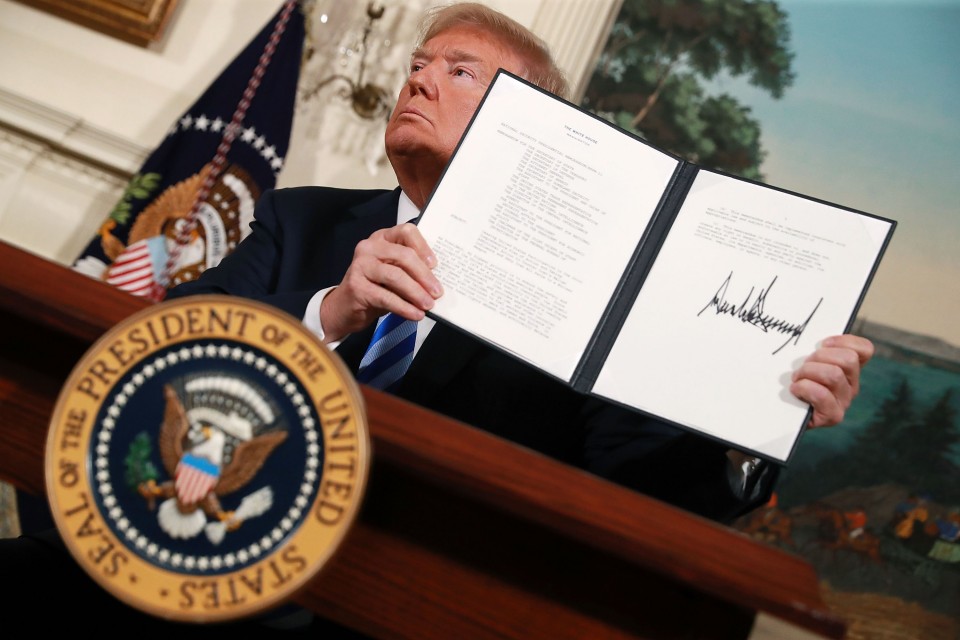Nathan Gardels is the editor-in-chief of Noema Magazine.
Abolhassan Bani-Sadr was the first president of the Islamic Republic of Iran. He now lives in exile near Paris. He spoke with WorldPost editor in chief Nathan Gardels on Wednesday, after the United States announced it was withdrawing from the agreement to curb Iran’s nuclear weapons development.
WorldPost: What do you think was behind President Donald Trump’s decision to withdraw from the Iran nuclear agreement?
Abolhassan Bani-Sadr: Barack Obama’s government made the nuclear agreement in order to balance the alliance of Israel and Saudi Arabia with Iran’s presence in the region and therefore to prevent that alliance from dominating the Middle East. Trump has done the opposite: He withdrew from the agreement to make it possible for Israel, Saudi Arabia and the United States to undo that balance.
WorldPost: Do you think this policy further isolates Iran or the United States?
Bani-Sadr: The Europeans — the European Union, France, Germany and the United Kingdom — along with Russia and China, signed the nuclear deal, and EU foreign policy chief Federica Mogherini and the leaders of France, Germany and the U.K. have made firm statements that they will continue to support the deal no matter what the United States does. The continent is coming to the conclusion that the United States, under Trump’s presidency, is becoming a “rogue state” and is incapable of leading the “free world.” On this issue, it is now allied only with Israel and Saudi Arabia; on the Paris climate pact Trump already withdrew from, the United States is totally alone.
Regarding the Iranian regime, it all depends on the power struggle within the regime. If President Hassan Rouhani can stay in power and remain in the agreement with the other signatories, isolation will not be the country’s lot. However, if the Iranian Revolutionary Guard commanders use this opportunity provided by Trump to seek total control of the state and government, then the Iranian regime will also become isolated.
WorldPost: Do you expect a Trump administrative effort at regime change in Iran through tougher sanctions or even military intervention?
Bani-Sadr: John Bolton, Trump’s national security advisor, is a well-known and public supporter of regime change in Iran. The irony is that new sanctions and the threat of war will only help the Iranian regime to solidify itself. Being able to leverage a constant state of crisis provoked by the United States is what enables the regime to continue. So, paradoxically, Trump’s policy will make the regime stronger, not weaker. It especially emboldens the hardliners who argued the United States couldn’t be trusted in this kind of deal — the mirror image of the Trump argument about Iran.
Logically, if Trump is truly aiming at regime change, the best way to achieve it is to remove all sanctions. This would deprive the regime of the enemy that it needs in order to survive. It would also provide the Iranian people with the breathing space they need to continue the struggle for independence, freedom and democracy.
However, if the United States were to attempt or support military intervention to change the regime in Iran, it would face a disaster many times worse than that experienced in Iraq and Afghanistan. Everyone, irrespective of whether they are reformers or hardliners or apolitical, will rise up against a foreign invader.
WorldPost: You have long been an opponent of the theocratic regime in Tehran since being driven into exile. But do you agree with Trump, and even some Europeans, like President Emmanuel Macron of France, who say Iran is promoting war and turmoil across the Middle East?
Bani-Sadr: It is a fact that the Iranian regime uses terror as a method in the wars in which it is engaged. However, it is also a fact that using terror to eliminate opponents is not the monopoly of this regime. The Israeli government, to name one example, also has a long history of eliminating its enemies through acts of assassination or other acts of terror.
Yes, it is true that I have long been an ardent critic of the dictatorial regime in Iran, which has evolved into a military-financial mafia. However, the truth should always be told. The fact is that the United States and its allies started, or further inflamed, all these wars across the Middle East. The United States alone started the wars in Afghanistan and Iraq. With France and others, they toppled Libyan leader Muammar Gaddafi and opened a war there. Along with Saudi Arabia, Qatar and Turkey, the United States armed jihadists in Syria. In Yemen, the United States and its allies were involved long before Iran.
This interview, edited and condensed for clarity, was produced by The WorldPost, a partnership of the Berggruen Institute and The Washington Post.





